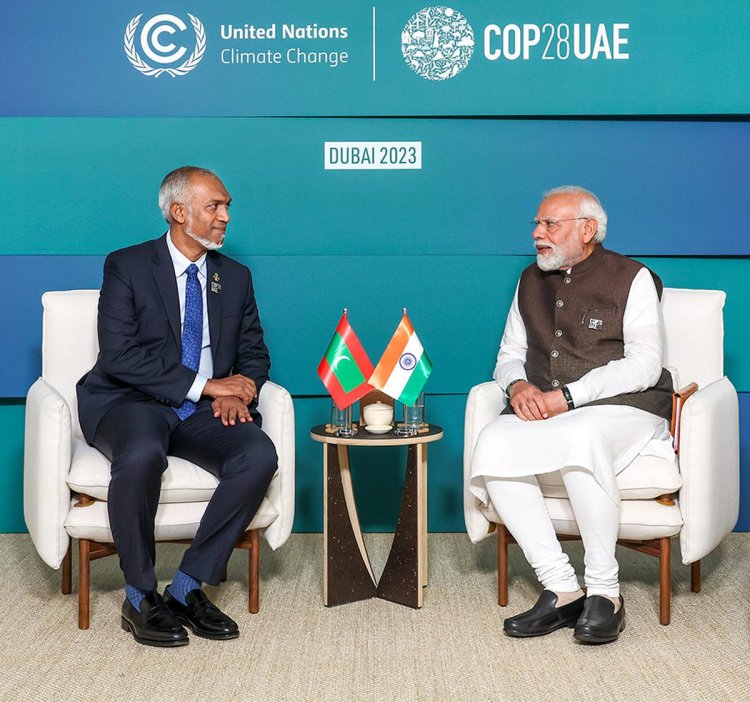India - Maldives: The Maldives Challenge
STORIES, ANALYSES, EXPERT VIEWS

The outcome of the second meeting of the India-Maldives High-level Core Group held on February 2, 2024, was an indication that the two sides are yet to fully concur on the question of Indian troops in the Maldives, and their possible removal before the March 15-deadline given by President Mohamed Muizzu.
In any case, the messaging was different. The Maldivian Foreign Ministry statement said: “Both sides agreed that the Government of India will replace the military personnel in one of the three aviation platform by 10 March 2024, and will complete replacing military personnel in the other two platforms by 10 May 2024,” while the Indian side was silent on dates. “Both sides also agreed on a set of mutually workable solutions to enable continued operation of Indian aviation platforms that provide humanitarian and medvac services to the people of Maldives,” the External Affairs Ministry said in its statement.
Notably, Maldives has sought Sri Lanka’s assistance in medical evacuation services — mainly to transport patients to Colombo in air ambulances — amid this persisting strain with India.
Muizzu’s China syndrome: reverse bullying
Meanwhile, China’s attempt at driving a wedge between India and its neighbours, in particular Maldives, is continuing. Maldives President Mohamed Muizzu is a rabid Islamist whose ‘small-country politician’ mindset is being used by China, Pakistan and Turkey to rile India. P Stobdan (Former Ambassador) speculates “they may have used Muizzu to corner India while they prefer to hide behind the scenes. It is necessary to view the move as a calculated component of their messaging.”
Muizzu made the right noises during his recent visit to China. He signed several MoUs, including one on becoming China’s ‘security partner’ for four years from this year. China promised to build a commercial harbour and expand the airport in Male to boost tourism, besides integrating the Maldivian economy with China’s flagship Belt and Road Initiative and the development of the blue economy.
The joint communiqué talked of a ‘comprehensive strategic cooperative partnership’, with both sides agreeing to firmly support each other in safeguarding their respective core interests, upholding national sovereignty, independence and national dignity and firmly opposing external interference in the affairs of the Maldives.
These are things for India to get worried about, writes Stobdan, “especially with regards to jointly developing the blue economy and Chinese ‘research vessels’ and spy ships prowling in the Indian Ocean, collecting sensitive data.”
After his return from Beijing, Muizzu struck a defiant note. “But his small-country syndrome is counterproductive when it comes to realism. The Chinese are no fools to sacrifice their market interests in India just for the sake of half-a-million Maldivian population. But Beijing is a master at using small countries as a means for psychologically bullying others. To let others attack is a mode of aggression — an assault by proxy applied by the Chinese in their non-contact warfare or information warfare strategy.”
Muizzu’s anti-India campaign would prove detrimental to the Maldives
Stobdan argues Muizzu’s anti-India campaign would prove detrimental to the Maldives sooner rather than later. “His brinkmanship will create severe hardship for his people, who rely on imports of essential items from India. His actions are bound to lead the country into financial debt, political turmoil and civil strife. Muizzu may be dreaming of transforming the Maldives into Singapore, but he is forgetting that in 1988, it was India that helped the nation thwart a coup attempt by businessman Abdullah Luthufi and a few armed mercenaries.”
More importantly, “the majority of the Maldivians do not wish to jeopardise their ties with India. They would rather worry about their future and not about Muizzu.”
Reverse bullying: India hasn’t done anything coercive against its smaller neighbours. Nor does India have a desire to alienate a country. “The Maldives’ unprovoked attack on India was a case of reverse bullying….”
China gradually reducing Maldives dependence on India
For the present however, Muizzu and China appear to be winning. While the number of Indian tourists visiting the Maldives has declined marginally, Chinese tourists have swifty filled this gap, resulting in an overall increase in tourist inflows, data show.
More worryingly, write Vignesh Radhakrishna, Principal Correspondent, Data, The Hindu and Sonikka Loganathan (Sub editor- Data · The Hindu) “the impact of the diplomatic fallout has been felt by more than just the tourism industry. Generally, 20,000 to 40,000 medical tourists from the Maldives visit India annually for treatment. On January 13, Muizzu announced that the government’s health insurance scheme will cover visits to the UAE and Thailand too, to ‘diminish reliance on a select group of countries’. He made this announcement immediately after his return from China. He also said that a 100-bed hospital with Chinese aid will be built.
Muizzu and Xi also signed key agreements, including agricultural schemes that would ‘end its [Maldives’] dependence on one country for imported staple foods such as rice, sugar, and flour,' by growing them locally. Currently, the Maldives relies heavily on India for a number of products.
The Maldives imports over 95% of its granite, 40% of its steel bars and coils, over 30% of tubes/pipes, electric motors and cement, 65% of flat-rolled iron and stainless steel sheets, and over 50% of bulldozers from India Moreover, it sources over 80% of rice, 60% of eggs, close to 30% of cattle meat, 50% of onions, melons and nuts, 25% of wheat, over 45% of crabs/shrimp/prawns and cabbages, and 40% of tomatoes from India. Essentially, write the two authors “the tourism boom in the Maldives — from food to stay — relies heavily on the supply of raw materials from India.”
The archipelago’s key agreements with China after the fallout with India “threatens this mutually beneficial relationship, and gives China more sway in the Indian Ocean region.”
















